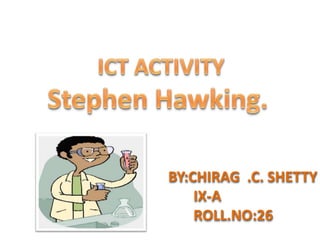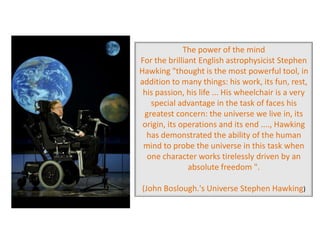Presentation 2 on stephen william hawking by chirag shetty
- 1. BY:CHIRAG .C. SHETTY IX-A ROLL.NO:26
- 3. The power of the mind For the brilliant English astrophysicist Stephen Hawking "thought is the most powerful tool, in addition to many things: his work, its fun, rest, his passion, his life ... His wheelchair is a very special advantage in the task of faces his greatest concern: the universe we live in, its origin, its operations and its end ...., Hawking has demonstrated the ability of the human mind to probe the universe in this task when one character works tirelessly driven by an absolute freedom ". (John Boslough.'s Universe Stephen Hawking)
- 4. Stephen William Hawking was born on January 8, 1942 (300 years after the death of Galileo) in Oxford, England. His parents were Frank and Elizabeth Hawking, who had three children: Stephen, Philippa and Mary, and adopted a boy named Edward.
- 5. When he was eight, his family moved to St. Albans, a town about 20 miles north of London. At the age of eleven, Stephen went to St. Albans School and then at University College, Oxford where for three years (1959-1962) studied physics, which studies the conclusion, A los 12 a├▒os, en el jard├Łn de su casa en St Alban y en 1962 durante su graduaci├│n en Oxford. in 1962, awarded first class honors in the specialty of Natural Sciences. But what attracted him was the cosmology, for what happens to study at the University of Cambridge, obtaining his Ph.D. in Theoretical Physics and Cosmology, in 1966.
- 6. Only two more years In full bloom of youth, Stephen begins to feel some variation in the speed of their movements, which become clumsy. At the insistence of his mother, see the doctor and after several tests he was diagnosed, in early 1963, amyotrophic lateral sclerosis (ALS) or Lou Gehrig's disease, rare disease characterized by degeneration progressive nervous system cells responsible for voluntary muscle movement. The symptoms of his illness became acute when in Persia, where he traveled in spite of knowing and his evil, he contracted a virus. His health deteriorated so much that doctors risked two years of life predicted maximum.
- 7. Stephen Hawking with his wife Jane and his son Tim after receiving his honorary degree at the University of Cambridge.
- 8. Member of the Royal Society When Hawking received his doctorate (1966) worked with Roger Penrose in the mathematical proof of the beginning of time. At this time began his teaching as an adjunct professor of Applied Mathematics and Theoretical Physics at Cambridge. Formulated theories about the uniqueness of the universe, the Big Bang, or the original explosion of Cosmos-and black holes. In 1974, when he was 32, he was conferred an honorary one of the most important of Great Britain membership of the Royal Society, the most prestigious scientific institution in the world. Hawking became one of the younger members who had the said company. At that time, Alan Hodgkin, Nobel Prize in Biology and Chairman of the society, had to approach the wheelchair to sign the book Hawking credited him as a member of the famed institution.
- 9. Another tough test In 1985, meeting at The European Organization for Nuclear Research (CERN), Stephen suffered an acute episode of pneumonia that was complicated as the doctors came to tell Jane, his wife, who was not worth keeping the life support machine lit. Nevertheless,
- 10. The technique allows you to overcome this challenge With such a difficult life, stoic and full of voluntarism for granted that Stephen was once again prevail. And so it happened. Walter Woltosz, a California computer expert, he decided to send him a design and creation software that would allow him to speak again through a synthesizer. This synthesizer set by David Mason to the wheelchair in which he was prostrate accompany him the rest of his life and through which Stephen would continue with all its academic and research work. Today, Hawking has replaced its old voice synthesizer with a new one with a British English accent. The former had an American accent. This new device is mounted, as above, in his wheelchair, and can process any type or size of text (such as email) and offering greater precision.
- 11. A Beautiful Mind Hakwing academic career is surprisingly bright. It starts with the procurement, ranking first as a researcher and later as a teacher at Gonville and Caius College, Cambridge. In 1973 the Institute of Astronomy leaves to join the Department of Applied Mathematics and Physics Theoretical, also in Cambridge, and in 1977 was appointed professor of Gravitational Physics. In 1979 he received the appointment of Lucasian Professor of Mathematics at Cambridge, famous chair occupied by such brilliant minds such as Isaac Newton and Paul Adrien Dirac. It also has twelve honorary graduations in such prestigious institutions as Oxford, Cambridge, Yale, Berkeley, Harvard, etc. In addition, a member of the U.S. National Academy of Sciences. Mention in 1989 and received a double international: Queen Elizabeth II named him a Companion of Honour and Spain granted the Prince of Asturias Award for Concord.
- 12. Talking about disability Stephen Hawking is aware of their suffering but also the serene face of adversity and confrontation which is more worthy of admiration, how could confront and tame without losing the humility that characterizes the scholar but not to the wise. In an interview made by the BBC was asked: - Why do you think you have made ŌĆŗit famous as a scientist? Do you think your disability has to do with that? And Hawking said: "I'm sure my disability has to do with why people are fascinated by the contrast between my very limited physical powers, and the vast nature of the universe I deal with. I'm the archetype of a disabled genius, or rather, a physically challenged genius, to be precise. At least I'm obviously with physical disabilities. If I am a genius that is more open to doubt.
- 13. Hawking in Oviedo (northern Spain), April 2005, for opening acts of the XXV anniversary of the Prince of Asturias Awards. He had received, in 1989, the Prince of Asturias Award for Concord, both for scientific as the example of his response to adversity in their fight against amyotrophic lateral sclerosis (ALS). In his speech at that time said: "There are good scientific programs on television, but some have only scientific marvels as something magical, without explaining whether or not to show how they fit into the framework of science. The producers of scientific programs for television should realize they have a responsibility to educate the public, not just to entertain. "














